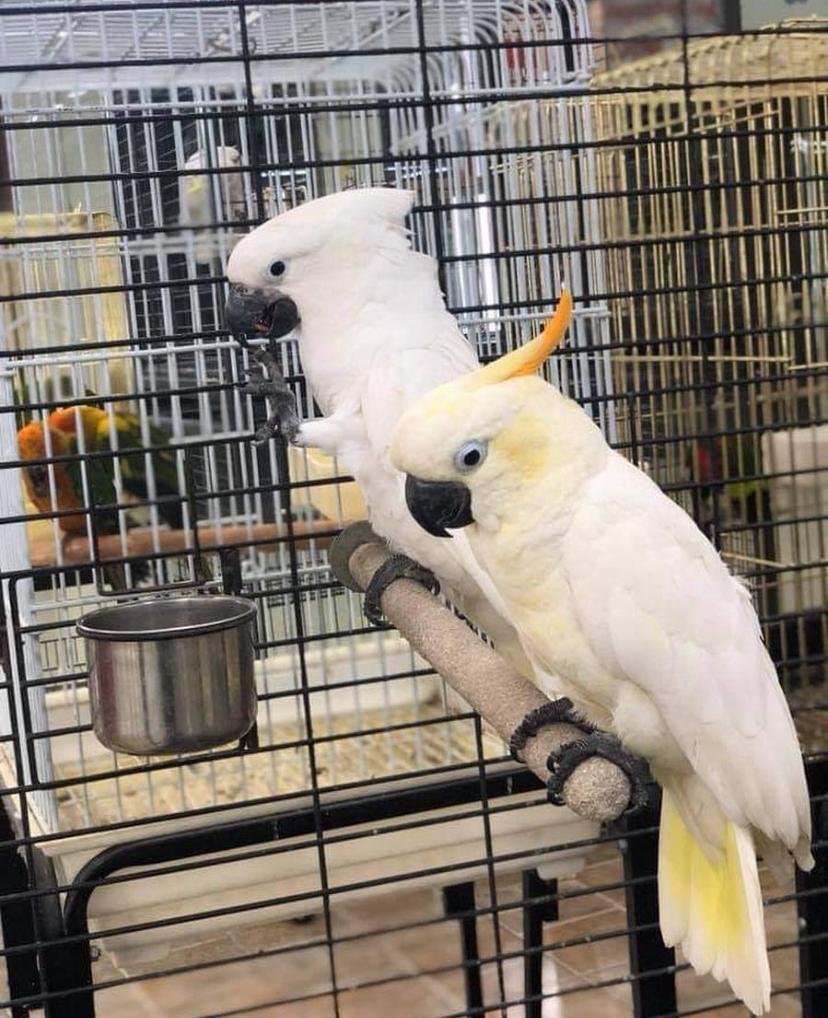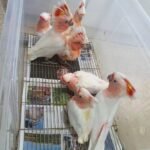
What foods are dangerous or toxic to cockatoos?
For a first-time cockatoo owner, one of the most stressful parts of caring for your new feathered family member is making sure their diet is not only nutritious but also safe(What foods are dangerous or toxic to cockatoos?). As Michael Anderson, owner of THE COCKATOO HOME, I’ve spent decades raising these intelligent and sensitive birds, and I can tell you that what you feed your cockatoo is the single most important factor in their long term health and happiness.
A common mistake many owners make is assuming that if a food is safe for humans, it must be safe for their bird. This is a dangerous misconception that can lead to serious health problems or even a fatal outcome. We’re going to dive deep into a list of common foods you must absolutely keep away from your cockatoo, covering everything from everyday kitchen staples to seemingly harmless snacks.
Key Takeaways
- Avocado and Chocolate are Absolute No-Gos: These two are among the most dangerous foods for cockatoos and can cause severe illness or death, even in small amounts.
- Avoid Human “Junk” Food: Foods high in fat, sugar, and salt, like chips, crackers, and candy, are extremely unhealthy for cockatoos and can lead to a host of health issues, including obesity and heart disease.
- Certain Fruits and Vegetables are Toxic: While many fruits and vegetables are excellent for cockatoos, others, like onions, garlic, and fruit pits, can be highly toxic. It’s crucial to know the difference.
- Caffeine and Alcohol are Fatal: These substances are highly toxic and should never, under any circumstances, be given to a cockatoo.
- Knowledge is Key: Understanding what foods are dangerous or toxic to cockatoos is a fundamental part of responsible pet ownership, and it’s a commitment that will ensure your bird lives a long and healthy life.
The Dangers Hiding in Your Pantry: What Foods Are Dangerous or Toxic to Cockatoos?
As a breeder, my primary focus is the health and well-being of every cockatoo that comes into my care, and that dedication extends to the birds you take home from THE COCKATOO HOME. I’ve spent years educating owners on the importance of proper nutrition. It’s a topic that comes up daily, and it’s a huge part of what makes our birds so healthy and well-adjusted. The question, “What foods are dangerous or toxic to cockatoos?“ is one of the most critical you can ask, and it’s a question I’m going to answer with the authority that comes from hands-on experience and a passion for these incredible birds.
Many new owners are surprised to learn that a bite of their favorite snack could be lethal to their parrot. Cockatoos have a much different metabolism than humans, and their bodies can’t process many of the things we take for granted. This is where the trust we build with our customers at THE COCKATOO HOME is so important. We don’t just sell you a bird; we equip you with the knowledge to be a fantastic owner, and that starts with knowing what what foods are dangerous or toxic to cockatoos.
Let’s start with the big ones, the non-negotiables that every single cockatoo owner should have memorized. Avocado is at the top of this list. It contains a fungicidal toxin called persin, which can cause respiratory distress, heart damage, and even sudden death in birds. Even a small amount can be fatal. Likewise, chocolate is a huge danger. It contains theobromine and caffeine, which can cause vomiting, diarrhea, tremors, seizures, and death. It’s easy to think, “Just a little piece won’t hurt,” but with cockatoos, it’s not worth the risk. A knowledgeable and experienced owner knows that these are not treats to be shared, but rather substances to be kept completely out of their bird’s reach.
The question of what foods are dangerous or toxic to cockatoos also extends to everyday items we keep in our refrigerators. Onions and garlic, for instance, contain sulfur compounds and allicin, respectively. These can irritate a bird’s mouth and digestive tract and can even lead to anemia by rupturing red blood cells. Raw beans are another food that can be toxic. While cooked beans are a healthy addition to a cockatoo’s diet, many raw beans contain hemagglutinin, which can be poisonous. When you’re dealing with such a sensitive creature, it’s always better to be safe than sorry. This level of detail and care is what sets a true breeder apart, and it’s a core principle of THE COCKATOO HOME.

Beyond the Obvious: What Foods Are Dangerous or Toxic to Cockatoos?
The list of things to avoid goes far beyond the most well-known toxins. It’s a common part of a transactional relationship with a reputable breeder to provide a comprehensive guide, and our clients at THE COCKATOO HOME receive exactly that. We’ve found that even seemingly innocent foods can cause major problems. For example, fruit seeds and pits from apples, pears, cherries, apricots, and peaches contain small amounts of cyanide.
While your cockatoo would likely have to eat a large quantity to get sick, it’s a risk that is easily avoided by simply removing the seeds and pits before feeding the fruit. A good rule of thumb is that if it’s a fruit with a hard pit or a seed core, it’s best to remove it before offering it to your bird. Understanding these finer points is crucial to answering the question of what foods are dangerous or toxic to cockatoos.
Many human treats are also on the “do not feed” list. The high levels of salt, sugar, and fat in chips, pretzels, and cookies are a recipe for disaster for a cockatoo. Their small bodies can’t handle the excess, and it can lead to obesity, liver disease, and other serious health problems. The same goes for dairy products.
While a small amount of low-lactose cheese or yogurt might be okay for some birds, cockatoos are generally lactose intolerant and can suffer from diarrhea and digestive upset. Instead of feeding them human junk food, a passionate bird owner will find healthy alternatives like unsalted nuts, low-sugar dried fruit, or a variety of fresh vegetables. This is the expertise that we, as breeders at THE COCKATOO HOME, are proud to share.
And let’s not forget about beverages. While a sip of coffee or a taste of soda might seem harmless, caffeine and sugar are terrible for a cockatoo. Caffeine can cause hyperactivity, increased heart rate, and cardiac arrest. Alcohol is a definite no-go as well, as even a small amount can be lethal to a bird’s system. Knowing what foods are dangerous or toxic to cockatoos isn’t just about avoiding a few key items; it’s about adopting a mindset of vigilance and care for your pet’s entire diet.
The Ultimate Cockatoo Diet: Safe Alternatives and Expert Guidance
Now that we’ve covered the bad, let’s talk about the good. A healthy cockatoo diet should be a balanced mix of high-quality pellets, fresh fruits, and vegetables. Pellets should make up the majority of their diet, providing a complete nutritional base. This is a point of authority that I always stress with my clients at THE COCKATOO HOME. From my experience, a seed-only diet is a recipe for nutritional deficiency and a shorter lifespan.
When it comes to fruits and vegetables, variety is key. My favorite recommendations for safe and healthy foods include dark green leafy vegetables like kale and spinach, and a variety of colorful options like carrots, sweet potatoes (cooked), bell peppers, and broccoli. Safe fruits include apples (without seeds), bananas, berries, and mangoes.
Offering your cockatoo a wide range of these foods not only ensures they get the vitamins and minerals they need but also provides mental stimulation as they explore new tastes and textures. It’s a fun and rewarding way to bond with your bird. Knowing what foods are dangerous or toxic to cockatoos is just one side of the coin; understanding what to feed them for optimal health is the other.
As a breeder, I’m often asked about the best way to transition a cockatoo from a seed-heavy diet to a more balanced one. This can be a challenging process, as many birds are resistant to change. The key is patience and persistence. Start by mixing a small amount of the new food in with their regular diet, gradually increasing the amount over several weeks. You can also try lightly steaming vegetables or mashing them to make them more appealing. At THE COCKATOO HOME, we’re always here to offer advice and support during this process, because we want to see every bird thrive.
Conclusion
Caring for a cockatoo is a long-term commitment, and providing the right diet is one of the most important things you can do to ensure their health and longevity. As Michael Anderson, I have made it my life’s work to ensure that the birds we provide at THE COCKATOO HOME are not only healthy and well-socialized but that their new owners are fully equipped with the knowledge to care for them properly.
Understanding what foods are dangerous or toxic to cockatoos is the first step in this journey. By avoiding the common pitfalls and providing a rich, varied diet of safe and nutritious foods, you are making an investment in your bird’s happiness and your own peace of mind. For more information on cockatoo care, or if you’re ready to find your perfect feathered companion, please explore our site.
Frequently Asked Questions
Q: Can I give my cockatoo a small amount of cheese or milk as a treat?

A: While some human foods, including certain dairy products, may not be directly toxic in tiny amounts, it’s generally best to avoid them. The question, “what foods are dangerous or toxic to cockatoos?” often has to do with more than just immediate poisoning. Cockatoos, like most birds, are lactose intolerant. Their digestive systems are not designed to process lactose, the sugar found in milk. Giving them cheese or milk, even in small amounts, can lead to digestive upset, including diarrhea and discomfort. The long-term effects of a high-fat diet can also lead to serious health issues like obesity and fatty liver disease. Instead of dairy, opt for safe and healthy treats like a small piece of unsalted, unbuttered whole-grain toast or a handful of fresh berries. Your cockatoo will appreciate the effort, and you’ll be ensuring their long-term health.



